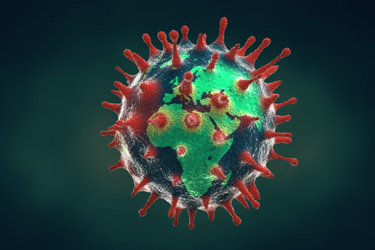How To Measure COVID-19's Impact On Clinical Trials In A Given Country
By Maya Zlatanova, FindMeCure Foundation

In the last few months, COVID-19 is the most discussed topic in any industry, especially the clinical research industry. The research space has been first impacted due to the fact that the coronavirus spread has caused a healthcare crisis leading to a lot of uncertainty in active or recruiting clinical trials. There have been numerous articles and webinars on “Top X reasons clinical trials are at risk and how to mitigate that.” Probably the most positive result of this situation is that technologies and services like remote monitoring, virtual trials, and home healthcare are no longer just discussions but instead are must-have components of every clinical trial that wants to continue providing support and safety to its patients.
That being said, no one knows how the pandemic will unravel and when (if) things will go back to normal. Though locked in their homes, clinical research and feasibility professionals are spending numerous hours on contingency planning and predicting what will be best for all ongoing trials, as well as the new clinical trials planned for a year or six months from now. One thing is clear: At least in the next year, research and patient recruitment strategies for current and new clinical trials will depend on the COVID-19 impact on countries and their landscapes. The only question is: How can we best evaluate what the impact will be?
I am working closely with feasibility experts, investigating the pandemic’s impact in order to support rescue of country and site selection and new patient recruitment strategies. We have identified three main layers that contribute to either higher or lower impact on clinical trials.
1. The Number Of Active Cases Of Coronavirus In The Country/State
The number of active cases of coronavirus gives you an overall picture of the current situation in any given country. The more the active cases, the bigger the pressure on healthcare. This means most of the sites and investigators in the region might be overwhelmed by treating the COVID-19 patients or at least avoiding any unnecessary visits to the hospitals. What is important to mention here, though, is that knowing the number of active cases in a country as big as the U.S. or China is not enough. If you look at the number per states or regions, you can easily see that some states are highly impacted, whereas others are not.
The number of active cases has a psychological impact on patients, too. The higher the numbers, the more scared society is. The so-called risk group – elderly people and people with oncological and autoimmune conditions – is likely to avoid anything to do with doctor appointments unless it is urgent. It’s also been observed in the last few weeks that if among the active cases there is a new patient who is a celebrity, this makes people feel even more afraid for themselves and their families. The opposite is true regarding trust in the government: If people don’t trust the politicians, they are more likely to neglect the recommendations related to the pandemic (as in, for example, Iran).
2. The Country’s Official “Stay-At-Home” Status
Many countries/states have decided to go under quarantine to avoid what happened in places like Italy, where the healthcare system was not prepared to accommodate the volume of patients that needed help. Yet, these quarantines are very dynamic, and the measures taken change quite often – usually varying from “stay-at-home” advice to “stay-at-home” enforcement. Being able to monitor this dynamic is very important in order to understand the country’s status and the current situation. The stricter the quarantine is (citizens are only allowed to go to the grocery store or the pharmacy), the fewer opportunities there are for conducting your clinical trial unless it is fully virtual and you can keep up with supply.
3. National Drug Agency Guidelines On Clinical Trials And The Technological Status Of Healthcare
The FDA and EMA and most of the national drug agencies submitted almost immediately their recommendations for how to conduct clinical trials during COVID-19. They are all centered on suggestions to use remote monitoring and visits to avoid any unnecessary risk of patients getting infected while out or at the hospital, where more patients with coronavirus are expected to be. It makes a huge difference whether the country had already been implementing any type of telemedicine as a part of its healthcare. For example, the U.K. has been on its way to keeping hospital visits as minimal as possible even prior to the pandemic, and it had an application that could provide immediate support to patients and healthcare professionals. In other countries, even though recommendations for remote options were there, the local institutions were not equipped to follow them and had to look for alternatives on the go or just stop recruitment or even the clinical trials themselves.
Conclusion
Let’s not forget that COVID-19’s impact on countries has another perspective as well – the manufacturing and distribution of APIs. When China was in its pandemic peak, a lot of clinical trials had to stop or go to plan B, as they didn’t have the drugs needed to continue.
In the next few months, we will observe the extent to which the quarantine is going to impact the world’s healthcare systems and which countries will take extra or, on the contrary, looser measures to cope with the pandemic. It will also be important to follow society’s reaction when people are allowed to go back to work, at the hospitals, etc. Two interesting scenarios we cannot predict just yet are possible. In one scenario, people will be amazed at how agile research around COVID-19 is and how efficiently it can provide the much-needed treatment, and they will start to view the brighter side of research in general. Or, most people will be afraid that COVID-19 can still pose a danger to their health and they won’t be open to frequently visiting hospitals. In both cases, we need to find the right solutions, because clinical research must go on.
About The Author:
 Maya Zlatanova is a clinical research entrepreneur and a founding member of the FindMeCure Foundation. She has spent the last 10 years developing and advocating for solutions to bring patients and patient communities closer to clinical trials. Previously, Zlatanova participated in the development of the national GCP online certification course endorsed by the Royal Academy of Medicine, UK, and has led training programs for the United Nations and multiple ministries of health.
Maya Zlatanova is a clinical research entrepreneur and a founding member of the FindMeCure Foundation. She has spent the last 10 years developing and advocating for solutions to bring patients and patient communities closer to clinical trials. Previously, Zlatanova participated in the development of the national GCP online certification course endorsed by the Royal Academy of Medicine, UK, and has led training programs for the United Nations and multiple ministries of health.
